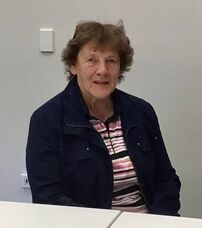The winter gales have arrived. Sometimes we walk the mile to school rugged up in jackets and rain coats, as the wind is too strong for me to battle against on my bike with John on the back. There is no such thing as being driven to school.
One wet Monday morning at the weekly flag raising ceremony, we stand at attention around the flag pole in the rain and salute the flag and recite. “I love God and my country. I honour the King. I salute the flag, etc. It’s considered too wet today for lessons, which means too wet to play outside, so we clear the desks from the school room and play cricket indoors. King George the fourth’s picture is still on the wall. He cops a blow to the head as it is struck by a ball hit by the teacher.
The result of this wonderful non schooling is boarding school in Melbourne. Through means both fair and foul, I persuade my parents to let me leave early. Happily I pick up my share of the farm work. It’s a great outdoor life but the wind is a constant challenge.
The following winter Dad visits family in England. I’m fifteen now and can run the farm while he’s away. We have a shocking wet winter. The dams are overflowing and breaking their banks. The sheep must be gone around twice a day in the rain as they are getting cast owing to the weight of their wet wool.
The wild westerly gales rip in to the Island with the force of a freight train. Huge combers charge across the shallow waters of the sand bar in Westernport Bay, like the flying manes of galloping white horses. Seagulls with their wings outspread face into the gale, empowered like albatrosses, floating on the up draught of the wind.
At the further uninhabited end of the Island beyond Swan Lake, we have a good over wintering paddock for five hundred merino wethers. This is a very lonely area; there is no one around for miles. The only sounds are the crash of the surf and the wind whining through old broken telephone wires.
By the time my father returns I can mend broken dam banks, strain a wire fence and shear a sheep with blade shears.
Rain drops spit and sizzle as they splatter on the hot glass of the hurricane lantern as Dad and I make our way through the stormy night to the shed. Tomato sauce bottles of warm milk are tucked inside our jackets to feed the pet lambs who are waiting anxiously for their late night feed. We sit on hay bales and play with the lambs, listening to the storm raging outside, laughing because Mother thinks we are raving mad to go out on a night like this, when the wind is howling in from Bass Strait.
I often visit friends who live several miles away across the island. There’s no traffic when I’m returning home on winter’s nights. Everyone is tucked down in the warmth of their houses. I have a tall bay mare that has a wonderful turn of speed. I give the mare her head and she takes off. Dark clouds scud across the sky. At times they part and the puddles on the unmade road reflect the silver light of the moon. The mare stands off and jumps every one of them in her path. Her hoof beats echo through the night. Farmers often say “I heard you going home the other night. It was a wild night to be out on a horse.”
Spring brings sunshine and a sparkling blue sea. Horses and cattle are losing their rough winter coats. A light breeze blows across the land rustling through the tops of the tall rye grass that is coming to seed in the paddocks that have been locked up to be cut for hay.
He arrives one Sunday afternoon wearing a fresh white shirt, with a stock whip looped casually over his arm and bearing a small posy of strawberry clover flowers. “I heard that you wanted to learn how to crack a stock whip and I picked these for you.” Suddenly life takes on a whole new meaning, full of hope and promise.
Amongst my treasures, carefully pressed between the pages of a book, there is a small bunch of strawberry clover. The tiny flowers have now turned to dust, but when I think of them I am a young girl, back on the Island with the wind blowing through my hair.
Bev Morton
July 2020


 RSS Feed
RSS Feed
